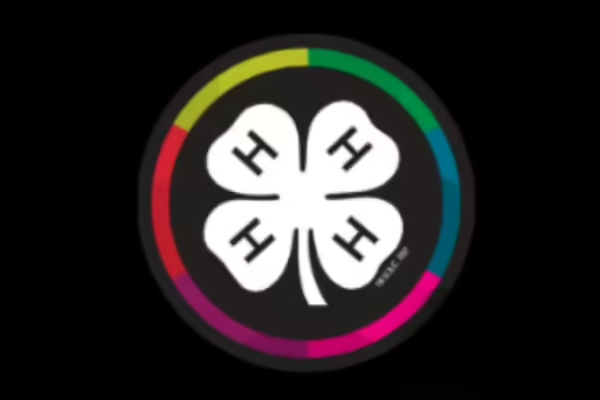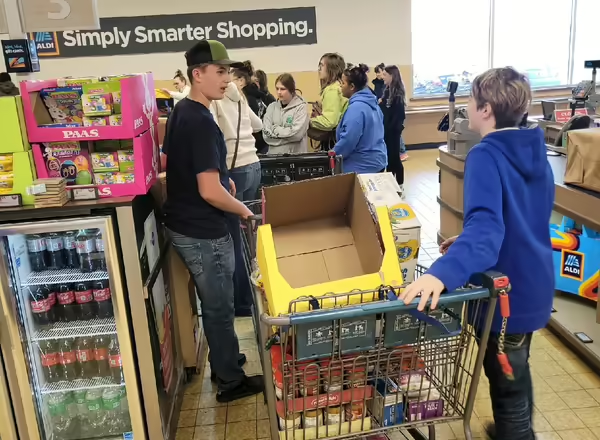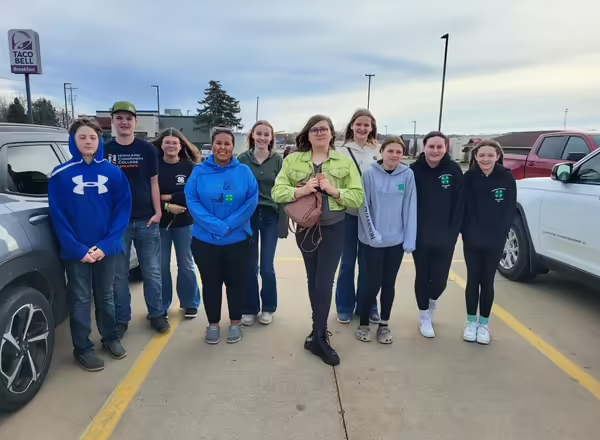
Stephenson County 4-H Ambassadors organized a Spring Break Backpack Project for area youth in need of food security this past spring. From start to finish 13 youth planned, organized, shopped, and packed 30 backpacks for 30 families and then delivered them to the Boys & Girls Club of Freeport.
Stephenson County 4-H is all about using our head, heart, hands, and health to give back to our club, community, country, and our world! Knowing there are families within our community that would struggle to provide meals during spring break, our youth saw an immediate need to help. The 4-H Ambassadors came up with a plan to put together backpacks that kids could take home on the last day of school before spring break – that are filled with good meals and snack options for kids to eat at home during spring break.
To help fund this project, 4-H Program Coordinator, Brenda Heimann applied for a Food Advocacy Grant through the Illinois State 4-H Office, which is funded by Compeer Financial. “By receiving this grant, the 4-H Ambassadors were able to sit down and figure out their plan of action to move forward,” says Brenda. “The youth involved were concerned about making sure the food we bought would not only last a week but would also be healthy and helpful to each family receiving it.”
A 4-H Ambassador, Aaliyah, brought forth the idea to reach out to the ten 4-H clubs in the county and ask for donations of “like-new” or “new” backpacks for this project. “If we can get the backpacks donated to our project, we can use all of our grant funds for food directly," says Aaliyah.
On March 16, the youth planned their shopping trip, which included three stores. The group split up into two groups when shopping with an adult in charge of each group. The kids had lists of what to get and how many of each item. Some of the items that the kids wanted to purchase were not available and the kids had to do some problem-solving to figure out what the next best item should be. “I learned how to budget during this shopping trip,” says 4-H Ambassador Jordan. “When you are buying in bulk like we were, you have to know your numbers and plan ahead!”
“The Stephenson County 4-H Ambassadors recognized that many families are facing a food disparity because of the rising costs of food and implemented a backpack program during spring break week to help offset that need,” says 4-H Educator, Kelly Lafferty. “The ambassador's willingness to help others in their communities is a fine example of how the 4-H program creates youth to become leaders and productive members of their communities. The 4-H program strives to show youth the importance of community service and how even small acts, such as 30 backpacks full of food and activities, can have a huge impact on the families and communities they serve.”
If you are interested in learning more about 4-H or our 4-H Ambassador program, please call our Stephenson County Extension office at 815-235-4125 or check out our website.
About 4-H: Illinois 4-H strives to help youth learn skills for living. 4-H programs are offered in every Illinois county by University of Illinois Extension. Illinois 4-H aims to impact the lives of 250,000 youth each year through sustained learning clubs and groups and short-term programming. 4-H is a community of seven million young people around the world learning leadership, citizenship, & life skills. For more information, contact University of Illinois Extension-Stephenson County at 815-235-4125.


University of Illinois Extension develops educational programs, extends knowledge, and builds partnerships to support people, communities, and their environments as part of the state's land-grant institution. Extension serves as the leading public outreach effort for University of Illinois Urbana-Champaign and the College of Agricultural, Consumer and Environmental Sciences in all 102 Illinois counties through a network of 27 multi-county units and over 700 staff statewide. Extension’s mission is responsive to eight strategic priorities — community, economy, environment, food and agriculture, health, partnerships, technology and discovery, and workforce excellence — that are served through six program areas — 4-H youth development, agriculture and agribusiness, community and economic development, family and consumer science, integrated health disparities, and natural resources, environment, and energy.